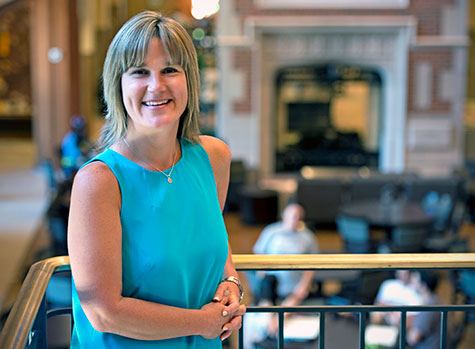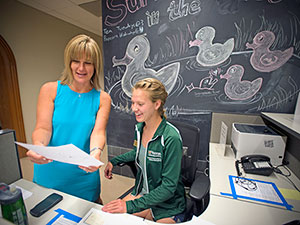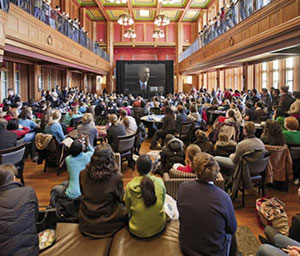
Since arriving in 2008, Leslie Heusted has helped establish Danforth University Center as an integral part of campus life. As director of the Danforth University Center & Event Management Office, she leads a staff of nine in booking approximately 15,000 events, meetings, activities and classrooms each year in the DUC as well as in Graham Chapel, Ridgley Hall’s Holmes Lounge and other spaces around campus.
We sat down to discuss students, nerf guns and the structured aimlessness of afternoon tea.
This fall marks the DUC’s fifth anniversary. Talk about the rhythms of the building. What’s your favorite time of day?
Well, there’s definitely an ebb and flow. The DUC has different personalities at different times of day. In the morning, when I arrive, the sun is streaming through the windows and it’s just breathtaking. There’s a quiet, serene beauty.
How long does that last?
Not long! [Laughs.] “Lunch” basically stretches from 10 a.m. to 4 p.m., and we’re in a constant, low roar of activity. In the late afternoon, there’s a bit of a lull, but then the evening has a completely different speed — a hum — as the building fills up with student organizations and events.
So those are the three sides of the DUC — the quiet, the roar and the hum.
You’re from Blue Springs, Mo., and did your undergraduate work at Truman State. What did you study?
Well, I majored in sociology, but I also “majored” in out-of-the-classroom activities — I was an RA (resident adviser) as well as a member of the activities board and co-director of the women’s center. In all those settings, I learned a lot about the ways people interact, which turned out to be perfect background for what I do now.

You earned a master’s of education from Oregon State and later coordinated events for the Kansas City Zoo and the Kansas City Convention Center before returning to higher education. What brought you back?
I just realized that higher education is where I need to be. My background is student activities and leadership development, and I think of myself primarily as an educator. I work with students to plan events, but I also teach them to think on their feet, to navigate situations and make things happen.
Problem solving, conflict resolution, crisis management … these are lifelong skills.
So what constitutes a crisis?
That depends on how you define the word. Nothing ever goes exactly as planned, however much you map it out, but changes don’t have to be catastrophic. The trick is to acknowledge a situation and find a way to work through it — and to do that pretty much on the fly. It’s a skill you only learn through experience.
You came to WUSTL less then a month after the DUC opened. What was your initial charge?
Well, the DUC is literally the crossroads of campus, the center point between the South 40 and The Village [WUSTL’s two major student living environments]. My charge was to build programs and activities that showcase the building as a university-wide center. This is a place for everybody.
So, how did you do that? Give us some examples.

The 2008 Vice Presidential Debate took place [at WUSTL] right after the building opened, and we tried to capture some of that energy. We hosted a big watch party with a giant, 9-by-12-foot screen and cardboard cutouts of the candidates. I think every chair in the building got pulled into the commons. It was a great inaugural event.
On a smaller scale, we started Tuesday Tea @ 3, which we’re still doing today with a co-sponsorship with Dining Services. Basically, we just put tea and some sweets out on a table and invite people over. It’s pretty unstructured, but the idea is to encourage informal conversation. People can use the time and space however they like.
Our Chamber Music Concert Series is a wonderful collaboration with the Department of Music, and brings in a lot of people from off-campus. We have regulars who arrive early and have dinner at Ibby’s, or stay afterward for a glass of wine.
Tell us about the Guinness book.
In 2010, the Junior Class Councils approached us about breaking the record for the world’s largest Nerf gun fight. We worked with them to develop a plan, gathered a critical mass of people and arranged for Guinness officials to observe. Then we just opened the doors.
That was a fun night. It was mayhem.
You’ve helped spearhead some recent renovations. Describe the work.
One of the great things about the DUC is how it was designed to grow and change with the needs of students. So we’ve added quite a bit of seating because we’re bursting at the seams over lunch, but we’ve also created a variety of nooks and crannies where people can have a little more privacy. The northeast corner used to be a series of doorways and hallways leading to the garage elevators, but we’ve opened that up to make it more welcoming.
On the third floor, we’ve done some work to the student media area. We have offices for Student Life, WUTV and Print Media — KWUR, the campus radio station, is moving in this summer — as well as some shared common spaces. The idea is to create opportunities for collaboration that didn’t exist before.
For those unaccustomed to staging events, what’s the big mistake we make? What should we be thinking about, but aren’t?
You have to begin with the ending in mind. What is the experience you want people to have? What’s the takeaway you want them to remember? Our job is to ask those questions and challenge people to articulate their vision. Once you know what you want to create, you can figure out the steps you need to get there.
Speaking of steps, you’re a pretty serious amateur runner. Any races coming up?
Yeah, I have a race later this summer. The goal is to run a half-marathon in every state. So far I’ve run nine, and one full marathon.
Your job is all about dealing with people. Are you a social runner?
No, I like to run alone. I think everyone needs to take some time and do things for themselves.
Some people have their best thoughts in the shower. I have my best thoughts when I’m running.